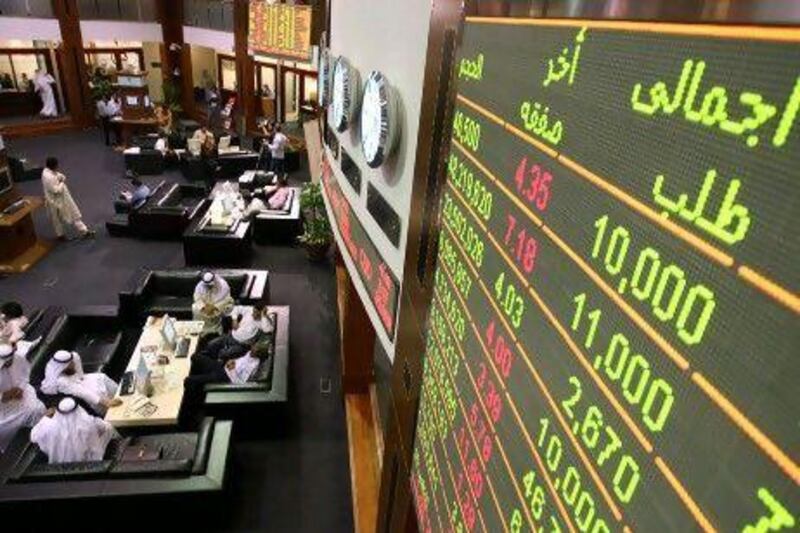The number of companies trading below Dh1 a share has risen dramatically over the past 12 months to almost a third of all listed stocks on the Abu Dhabi market.
The news raises the spectre of a large number of shares being suspended.
According to regulations established by the Securities and Commodities Authority (SCA), a company cannot raise money from shareholders when its shares are below Dh1, and the watchdog has the right to suspend trading of a company's shares once they fall below 40 fils.
"This is a dangerous signal to the market and reflects just really how negative sentiment is at the moment," said Mohammed Ali Yasin, the chief investment officer at CAPM Investment. "These companies are trading below their book value. In other words, if you liquidated these firms, you would get more than where they are trading at the moment."
In Abu Dhabi, 21 out of the 66 companies are trading below Dh1 a share, and seven of those are at less than 40 fils. Dana Gas, Waha Capital, Green Crescent Insurance and RAK Properties, among the most actively traded and liquid stocks on the Abu Dhabi Securities Exchange General Index, are all trading near the 40 fils threshold.
Twenty-eight of the 64 stocks on the Dubai Financial Market are at less than Dh1, with 12 of those near the 40 fils threshold.
SCA declined to comment yesterday. In October, Abdullah Al Turifi, the authority's chief executive, said the situation was highly unusual.
"The regulation is there for normalcy in the markets, but now we are living with a crisis," he said at the time.
Last year was bad for regional investors as Gulf stock markets lost more than US$50 billion (Dh183.66bn), buffeted by the Arab Spring and Europe's ongoing debt crisis. The Abu Dhabi bourse fell by 11.6 per cent last year, while the Dubai Financial Market General Index lost 16.9 per cent
In more developed markets, companies frequently buy back shares in response to low valuations. US companies repurchased $397 billion of stock last year, according to Bloomberg News data. On the Abu Dhabi bourse, by contrast, only two companies have bought back shares.
"Companies would be buying back their shares in the event that they had excess cash and believed the money they would generate from the buy-back in the long term would be higher than their core business," said Hassan El Salah, the head of institutional trading at Al Ramz Securities in Abu Dhabi.
"The situation is not like this," Mr El Salah said.
Bank of Sharjah bought 163 million of its own shares over the past 12 months. First Gulf Bank, a lender controlled by Abu Dhabi, distributed 75 million shares last year as bonus stock after a two-year buy-back programme.
In the absence of buy-backs, fund managers are calling for the Abu Dhabi exchange to change the minimum price movement, or "tick size", from 1 fil to 0.1 fil. Currently, the 1 fil spread between bid and ask prices triggers volatile price swings.
"These penny stocks are becoming more attractive to retail speculators and less attractive to institutional investors because it is easier to move prices for the purposes of manipulation, window dressing and invites all kinds of rumours into the market, which is not healthy," said Haissam Arabi, the chief executive at the asset manager Gulfmena Investments.
Retail investors account for up to 80 per cent of the trading on the UAE bourses.
"The stock markets have become more of a trader market where participants make a few points between a spread, rather than take a long-term investment mentality," said Saleem Khokhar, the head of equities at National Bank of Abu Dhabi. "Over the next period, you will see much less institutional guys in the market and far more retail."






